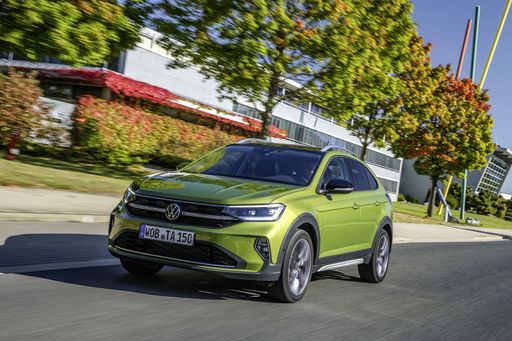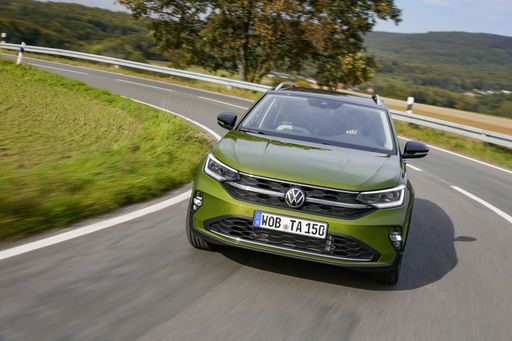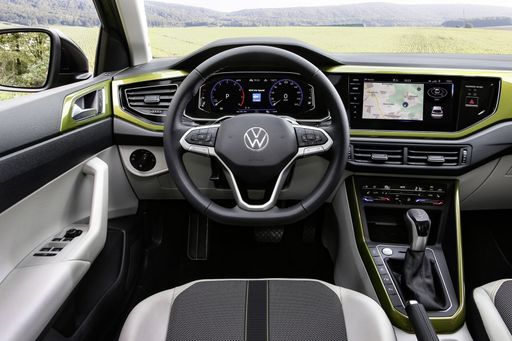Hyundai Tucson vs VW Taigo - Differences and prices compared
Compare performance (288 HP vs 150 HP), boot space and price (20900 £ vs 19900 £ ) at a glance. Find out which car is the better choice for you – Hyundai Tucson or VW Taigo?
Costs and Efficiency:
When it comes to price and running costs, the biggest differences usually appear. This is often where you see which car fits your budget better in the long run.
VW Taigo has a slight advantage in terms of price – it starts at 19900 £ , while the Hyundai Tucson costs 20900 £ . That’s a price difference of around 977 £.
Fuel consumption also shows a difference: Hyundai Tucson manages with 2.70 L and is therefore decisively more efficient than the VW Taigo with 5.30 L. The difference is about 2.60 L per 100 km.
Engine and Performance:
Power, torque and acceleration are the classic benchmarks for car enthusiasts – and here, some clear differences start to show.
When it comes to engine power, the Hyundai Tucson has a decisively edge – offering 288 HP compared to 150 HP. That’s roughly 138 HP more horsepower.
In acceleration from 0 to 100 km/h, the Hyundai Tucson is hardly perceptible quicker – completing the sprint in 7.50 s, while the VW Taigo takes 8.20 s. That’s about 0.70 s faster.
There’s also a difference in torque: Hyundai Tucson pulls distinct stronger with 379 Nm compared to 250 Nm. That’s about 129 Nm difference.
Space and Everyday Use:
Whether family car or daily driver – which one offers more room, flexibility and comfort?
Both vehicles offer seating for 5 people.
In curb weight, VW Taigo is clearly perceptible lighter – 1229 kg compared to 1542 kg. The difference is around 313 kg.
In terms of boot space, the Hyundai Tucson offers evident more room – 620 L compared to 440 L. That’s a difference of about 180 L.
When it comes to payload, Hyundai Tucson to a small extent takes the win – 545 kg compared to 457 kg. That’s a difference of about 88 kg.
Who wins the race in the data check?
The Hyundai Tucson is decisively ahead in the objective data comparison.
This result only shows which model scores more points on paper – not which of the two cars feels right for you.
Costs and Consumption
View detailed analysis
Engine and Performance
View detailed analysis
Dimensions and Body
View detailed analysis

Hyundai Tucson
Hyundai Tucson
Hyundai Tucson marries bold, sculpted looks with a clever, roomy cabin that feels smarter than its price tag suggests. It's composed on the road, easy to live with day-to-day, and a sensible choice for buyers who want SUV style without the showroom theatrics.
details




VW Taigo
The VW Taigo brings coupe-like flair to the compact crossover scene with sharp styling and an interior that punches above its price, feeling smarter than you’d expect. It’s an easygoing daily companion that balances comfort and practicality with a playful wink, perfect for city drivers who want something livelier than a regular hatchback.
details




Costs and Consumption |
|
|---|---|
|
Price
20900 - 47900 £
|
Price
19900 - 31800 £
|
|
Consumption L/100km
2.7 - 7.6 L
|
Consumption L/100km
5.3 - 5.8 L
|
|
Consumption kWh/100km
-
|
Consumption kWh/100km
-
|
|
Electric Range
63 - 70 km
|
Electric Range
-
|
|
Battery Capacity
-
|
Battery Capacity
-
|
|
co2
62 - 172 g/km
|
co2
120 - 132 g/km
|
|
Fuel tank capacity
52 - 54 L
|
Fuel tank capacity
-
|
Dimensions and Body |
|
|---|---|
|
Body Type
SUV
|
Body Type
SUV
|
|
Seats
5
|
Seats
5
|
|
Doors
5
|
Doors
-
|
|
Curb weight
1542 - 1893 kg
|
Curb weight
1229 - 1302 kg
|
|
Trunk capacity
546 - 620 L
|
Trunk capacity
440 L
|
|
Length
4525 - 4535 mm
|
Length
-
|
|
Width
1865 mm
|
Width
1757 mm
|
|
Height
1650 mm
|
Height
-
|
|
Max trunk capacity
1795 - 1799 L
|
Max trunk capacity
-
|
|
Payload
518 - 545 kg
|
Payload
448 - 457 kg
|
Engine and Performance |
|
|---|---|
|
Engine Type
Petrol, Full Hybrid, Plugin Hybrid, Diesel MHEV
|
Engine Type
Petrol
|
|
Transmission
Manuel, Automatic
|
Transmission
Manuel, Automatic
|
|
Transmission Detail
Manual Gearbox, Dual-Clutch Automatic, Automatic Gearbox
|
Transmission Detail
Manual Gearbox, Dual-Clutch Automatic
|
|
Drive Type
Front-Wheel Drive, All-Wheel Drive
|
Drive Type
Front-Wheel Drive
|
|
Power HP
136 - 288 HP
|
Power HP
95 - 150 HP
|
|
Acceleration 0-100km/h
7.5 - 11.6 s
|
Acceleration 0-100km/h
8.2 - 11.1 s
|
|
Max Speed
196 - 204 km/h
|
Max Speed
-
|
|
Torque
250 - 379 Nm
|
Torque
175 - 250 Nm
|
|
Number of Cylinders
4
|
Number of Cylinders
3 - 4
|
|
Power kW
100 - 212 kW
|
Power kW
70 - 110 kW
|
|
Engine capacity
1598 cm3
|
Engine capacity
999 - 1498 cm3
|
General |
|
|---|---|
|
Model Year
2025
|
Model Year
2024 - 2025
|
|
CO2 Efficiency Class
F, D, E, B
|
CO2 Efficiency Class
D
|
|
Brand
Hyundai
|
Brand
VW
|
What drive types are available for the Hyundai Tucson?
Available configurations include Front-Wheel Drive or All-Wheel Drive.




